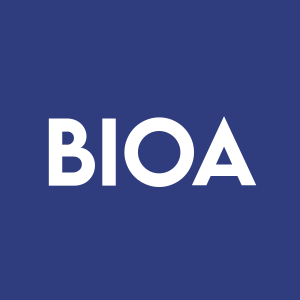Leqembi® approved for IV maintenance treatment in China
Rhea-AI Summary
BioArctic AB (Nasdaq Stockholm: BIOA B) announced that its partner Eisai has received approval from China's NMPA for Leqembi's (lecanemab) IV maintenance treatment in early Alzheimer's disease. The new approval allows for a maintenance dosing regimen of 10 mg/kg once every four weeks after an 18-month initiation phase of bi-weekly dosing.
Leqembi, initially approved in China in January 2024, is notable as the only approved therapy targeting both amyloid plaque and protofibrils in Alzheimer's disease treatment. The drug was developed through a collaboration between BioArctic and Eisai, based on Professor Lars Lannfelt's research on the Arctic mutation in Alzheimer's disease.
Positive
- Approval for maintenance dosing provides more flexible treatment options for patients
- Leqembi is uniquely positioned as the only therapy targeting both amyloid plaque and protofibrils
- Expanded market presence in China, a significant market for Alzheimer's treatment
- BioArctic maintains commercialization rights in Nordic region with Eisai
Negative
- Extended 18-month initiation phase required before maintenance dosing
- Treatment still requires regular hospital visits for IV administration
News Market Reaction
On the day this news was published, BIOA gained 0.55%, reflecting a mild positive market reaction. Argus tracked a peak move of +4.2% during that session. Our momentum scanner triggered 18 alerts that day, indicating notable trading interest and price volatility. This price movement added approximately $1M to the company's valuation, bringing the market cap to $213M at that time.
Data tracked by StockTitan Argus on the day of publication.
In January 2024, lecanemab was approved for the treatment of Alzheimer's disease (AD) in patients with mild cognitive impairment (MCI) or mild dementia stage of disease (collectively referred to as early AD) in
AD is a progressive, relentless disease characterized by formation of protein deposits known as plaques made of amyloid-beta aggregates and neurofibrillary tangles made of tau protein in the brains of people living with AD. It is caused by a continuous underlying neurotoxic process that begins before amyloid plaque accumulation and continues after plaque removal.[i],[ii],[iii],[iv] The data show that Aβ protofibrils[1] and tau tangles play roles in the neurodegeneration process,i,ii and Leqembi is the only approved therapy that fights AD in two ways – targeting both amyloid plaque and protofibrils, which can impact tau downstream.
Leqembi is the result of a long-standing collaboration between BioArctic and Eisai, and the antibody was originally developed by BioArctic based on the work of Professor Lars Lannfelt and his discovery of the Arctic mutation in Alzheimer's disease. Eisai is responsible for the clinical development, applications for market approval and commercialization of Leqembi for Alzheimer's disease. BioArctic has the right to commercialize Leqembi in the Nordic region together with Eisai and the two companies are preparing for a joint commercialization in the region.
This information is information that BioArctic AB (publ) is obliged to disclose pursuant to the EU Market Abuse Regulation. The information was released for public disclosure, through the agency of the contact person below, on September 29, 2025, at 08:15 a.m. CET.
For further information, please contact:
Oskar Bosson, Vice President Communications and Investor Relations
E-mail: oskar.bosson@bioarctic.com
Telephone: +46 70 410 71 80
About lecanemab (Leqembi®)
Lecanemab is the result of a strategic research alliance between BioArctic and Eisai. It is a humanized immunoglobulin gamma 1 (IgG1) monoclonal antibody directed against aggregated soluble (protofibril) and insoluble forms of amyloid-beta (Aβ).
Lecanemab is approved in 50 countries including the
Since July 2020, Eisai's Phase 3 clinical study (AHEAD 3-45) with lecanemab in individuals with preclinical Alzheimer's disease, meaning they are clinically normal and have intermediate or elevated levels of amyloid in their brains, is ongoing. The study was fully recruited in October 2024. AHEAD 3-45 is a four-year study conducted as a public-private partnership between Eisai, Biogen and the Alzheimer's Clinical Trial Consortium that provides the infrastructure for academic clinical trials in Alzheimer's disease and related dementias in the
About the collaboration between BioArctic and Eisai
Since 2005, BioArctic has a long-term collaboration with Eisai regarding the development and commercialization of drugs for the treatment of Alzheimer's disease. The most important agreements are the Development and Commercialization Agreement for the lecanemab antibody, which was signed 2007, and the Development and Commercialization agreement for the antibody Leqembi back-up for Alzheimer's disease, which was signed 2015. In 2014, Eisai and Biogen entered into a joint development and commercialization agreement for lecanemab. Eisai is responsible for the clinical development, application for market approval and commercialization of the products for Alzheimer's disease. BioArctic has the right to commercialize lecanemab in the Nordic region and is currently preparing for commercialization in the Nordics together with Eisai. BioArctic has no development costs for lecanemab in Alzheimer's disease and is entitled to payments in connection with sales milestones as well as royalties on global sales.
About BioArctic AB
BioArctic AB (publ) is a Swedish research-based biopharma company focusing on innovative treatments that can delay or stop the progression of neurodegenerative diseases. The company invented Leqembi® (lecanemab) – the world's first drug proven to slow the progression of the disease and reduce cognitive impairment in early Alzheimer's disease. Leqembi has been developed together with BioArctic's partner Eisai, who are responsible for regulatory interactions and commercialization globally. In addition to Leqembi, BioArctic has a broad research portfolio with antibodies against Parkinson's disease and ALS as well as additional projects against Alzheimer's disease. Several of the projects utilize the company's proprietary BrainTransporter™ technology, which has the potential to actively transport antibodies across the blood-brain barrier to enhance the efficacy of the treatment. BioArctic's B share (BIOA B) is listed on Nasdaq Stockholm Large Cap. For further information, please visit www.bioarctic.com.
[1] Protofibrils are believed to contribute to the brain injury that occurs with AD and are considered to be the most toxic form of Aβ, having a primary role in the cognitive decline associated with this progressive, debilitating condition. Protofibrils cause injury to neurons in the brain, which in turn, can negatively impact cognitive function via multiple mechanisms, not only increasing the development of insoluble Aβ plaques but also increasing direct damage to brain cell membranes and the connections that transmit signals between nerve cells or nerve cells and other cells. It is believed the reduction of protofibrils may prevent the progression of AD by reducing damage to neurons in the brain and cognitive dysfunction.
[i] Eisai presents full results of lecanemab Phase 3 confirmatory Clarity AD study for early Alzheimer's disease at Clinical Trials on Alzheimer's Disease (CTAD) conference. Available at: https://www.eisai.co.jp/news/2022/news202285.html
[ii] Hampel H, Hardy J, Blennow K, et al. The amyloid pathway in Alzheimer's disease. Mol Psychiatry. 2021;26(10):5481-5503.
[iii] Amin L, Harris DA. Aβ receptors specifically recognize molecular features displayed by fibril ends and neurotoxic oligomers. Nat Commun. 2021;12:3451. doi:10.1038/s41467-021-23507-z
[iv] Ono K, Tsuji M. Protofibrils of Amyloid-β are Important Targets of a Disease-Modifying Approach for Alzheimer's Disease. Int J Mol Sci. 2020;21(3):952. doi: 10.3390/ijms21030952. PMID: 32023927; PMCID: PMC7037706.
This information was brought to you by Cision http://news.cision.com
https://news.cision.com/bioarctic/r/leqembi--approved-for-iv-maintenance-treatment-in-china,c4241260
The following files are available for download:
|
Leqembi® approved for IV maintenance treatment in |
![]() View original content:https://www.prnewswire.com/news-releases/leqembi-approved-for-iv-maintenance-treatment-in-china-302569248.html
View original content:https://www.prnewswire.com/news-releases/leqembi-approved-for-iv-maintenance-treatment-in-china-302569248.html
SOURCE BioArctic







